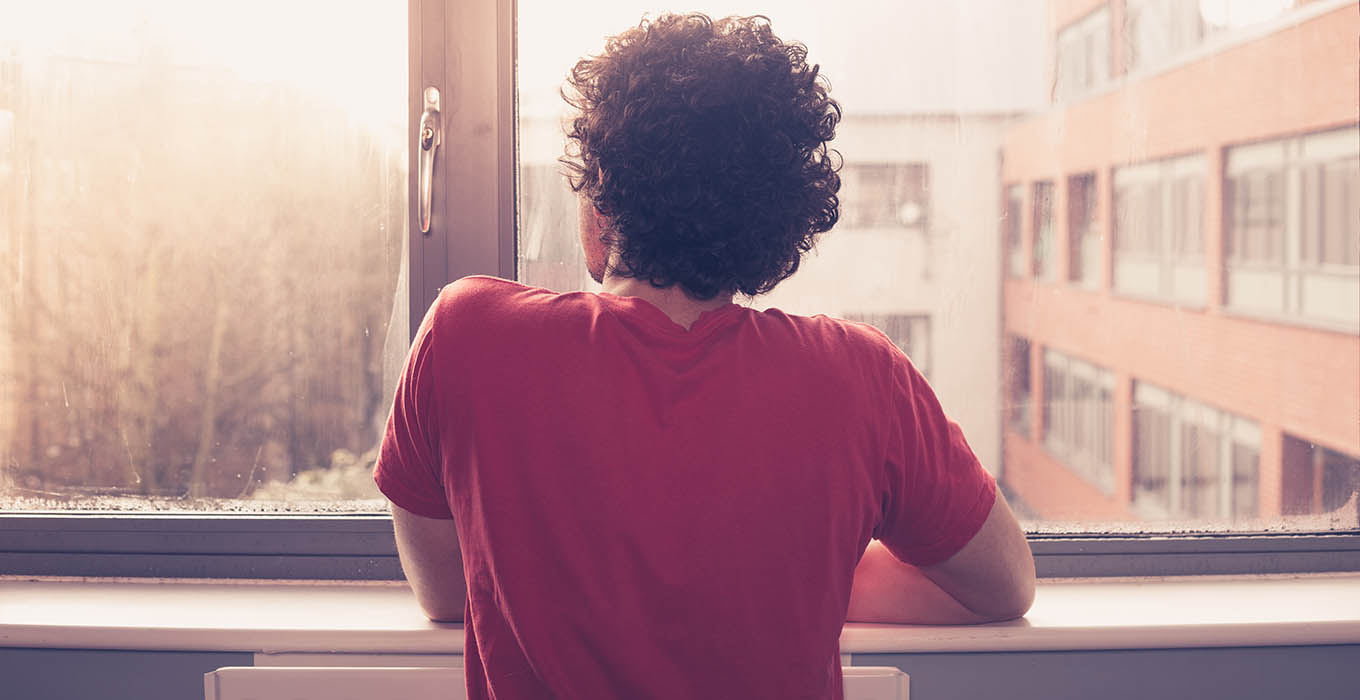Understanding Male Loneliness & The Silent Epidemic Of Lonely Men

At its root, loneliness is the discrepancy between the level of social interaction one has versus the amount one desires.
- A 2019 study discovered that 32% of men in the UK didn’t have anyone they considered a best friend, compared to 25% of women, and that 17% of men find it “very difficult” to make new friends.
- Struggling with feelings of inferiority, not being “macho” enough, and the stigma of expressing their emotions are common reasons why men feel lonely.
- In men, loneliness can present itself as anything from erratic behavior to self-isolation, and it’s essential to be aware of both the signs of loneliness in men and the link between loneliness in men and suicide.
Struggling with loneliness or having a mental health crisis?
- Suicide Prevention Lifeline: 1-800-273-TALK (8255); Deaf or hard of hearing dial 711 before the number or connect via online chat
Chaz Wyland, a business owner in his thirties, said he feels lonely at least a few times a week — and just about every other day.
Similarly, Chris Reed, a 38-year-old from California, said that he feels lonely most days.
Felipe Vernaza, 24, who lives in Toronto but grew up in Colombia, explained that he feels embarrassed to admit he’s lonely.
Chaz, Chris, and Felipe aren’t alone in their experiences — although it’s understandable if you think otherwise, given how rarely anyone actually talks about male loneliness.
Unfortunately, this “silent epidemic,” as it’s sometimes referred to, is incredibly common.
What Is Male Loneliness & How Common Is It?

Dr. Julianne Holt-Lunstad, a professor of psychology and neuroscience at Brigham Young University, explained that loneliness often occurs as an “adaptive response.”
Some situations make men more prone to feeling lonely and the stigma surrounding male loneliness often increases loneliness in men, too.
While it’s important to note that a man’s gender isn’t necessarily the direct or sole cause of male loneliness, it does play a role in many cases.
Being a man doesn’t mean you’re guaranteed to feel lonely all the time, but the fact is that many men are lonely.
Other studies suggest that men become increasingly lonely as they get older — and we’ll talk about why this might be the case in just a bit.
A 2018 study discovered that 52% of men from 60 to 64 years old categorize themselves as lonely.
However, it’s hard to give exact statistics about how frequently men struggle with loneliness because studies show that men are less likely to report being lonely.
Ohio therapist Billy Roberts, LISW (Licensed Independent Social Worker), confirmed that loneliness in men isn’t unusual.
However, he said, “Loneliness in men is very common. Whether or not they acknowledge it and how they cope with those feelings is another story.”
Shagoon Maurya, psychologist and founder of ursafespace.com, shared similar sentiments.
She explained that toxic masculinity, an ideology that suggests that men must always be strong and stoic, might be partly to blame for men underreporting their loneliness. She said:
“Society has always been driven from the ideology of a man being ‘stronger’ than women. While this empowered men to prosper, it also instilled the wrong definition of strength, also called toxic masculinity.
Due to this, men think that it is a sign of weakness to talk about feelings and seek help. This severely restricts men from reporting feelings of sadness.”
In reality, loneliness is a normal feeling for everyone — including men — but the stigma of admitting it causes many lonely men to remain silent.
Although there is a social stigma that surrounds male loneliness, it is a common experience among men from all walks of life.
The statistics are likely underreported because so many men feel they should remain stoic, even when they’re struggling.
Why Do Men Feel Lonely?

Even though men might express their feelings of loneliness differently than women or gender non-conforming folks, they experience it for many of the same reasons everyone else does.
Of course, there are also a few male-specific causes of loneliness in men.
Reasons for male loneliness can include:
- Major life changes, such as moving to a new area, starting a new job, or divorce
- Holidays like Thanksgiving or big life events that aren’t shared with others
- Disconnects caused by intellectual differences
- Single fatherhood
- Social anxiety
- Depression
- Feeling as if they don’t have the “right” to discuss their loneliness with others
- Physical or mental health issues
- Grief, or grieving alone — whether following the death of a loved one or the loss of a friendship
- “Empty Man Syndrome,” a term that describes depression and loneliness in a subset of men who are often in their forties, single or divorced, live alone, have no close friends, and either dislike their job or are unemployed
- Frequent social media use and making comparisons to others on various social media platforms
- Being part of an already marginalized group of people, such as being queer, transgender, or BIPOC
- COVID-19 and its lasting effects on socialization
Whether you’ve just landed a new job, found a new hobby, or you’re celebrating the holidays, it’s nice to share parts of your life with people who care about you.
However, many men struggle to find a sense of connection with others and some may avoid marriage — even if it’s something they want. Some may find it difficult to express their feelings of love to their partners, as well.
Billy Chan, a 33-year-old living in Hong Kong, explained that holidays and major life changes often cause him to feel lonely. He said:
“When certain festivals come up, such as Valentine’s Day, Christmas, and New Year, loneliness hits me hard. I feel lonely when celebrations are coming up, when everyone reminds me that it’s a special day [and] that I should spend with friends and my partner. Secondly, I feel lonely when I experience a setback in life that I’d like to share with others immediately.”
Additionally, COVID-19 and its effects caused a spike in loneliness in everyone, including men.
Loneliness overall increased 181% during the pandemic compared to before it began, and 55% of men reported feeling lonely during the pandemic.
Though external factors can spur feelings of loneliness, men may also experience emotional and intellectual disconnects.
Emotional loneliness can be particularly difficult for men, as they are often socialized to express fewer emotions.
After all, how are you supposed to connect with anyone if you can’t truly be open with them?
Felipe Vernaza, a gay man who grew up in Colombia, struggled with loneliness as a young adult. He felt isolated from others and struggled to share his feelings with other people.
“I did not come out until I was 24,” Felipe explained. “My high school and university experiences were quite lonely (despite having amazing friends) because I was not my true self and could not open up to anyone.”
There’s more than one reason why men may feel hesitant to open up to others.
Chris Reed from California said that he often feels uncertain when it comes to sharing feelings of loneliness because he worries they will be seen as less important or valid when compared to others. He said:
“As a man in this society, no matter how open-minded your company may be, it feels as though a man is not allowed to vent or express feelings of weakness. I am fortunate to have a wife that likes the fact that I can be vulnerable and open up to her, but even between us, there is only so much that feels acceptable.
It feels as though it is hard for people to ‘see’ men be open about their vulnerabilities without being labeled into this newly coined ‘male fragility’ category. Things bother us men all the time, but because we have not had the struggles so many other groups have had to endure over the years, we sometimes feel that our struggles are not as valid.”
Unfortunately, this stigma against men expressing their emotions is widespread.
One study explored the ways men seek (and find) support, discovering that although some men “actively sought emotional support” when dealing with feelings of loneliness, many of them “did not know how to talk about these feelings or felt embarrassed to do so.”
Additionally, limited access to resources can make it difficult for men in marginalized communities to access quality care, and this frustration can lead to increased feelings of isolation and loneliness.
As a whole, there are countless reasons why men feel lonely, but the fact is that many do, and often.
As a whole, loneliness in men isn’t uncommon, even though it’s rarely discussed.
What Are Signs Of Loneliness In Men?

The signs of loneliness in men can vary depending on the person and the situation. However, we do know that men often express loneliness differently than women and gender non-conforming folks.
Psychotherapist Jennifer Stafford, LMHC (Licensed Mental Health Counselor) from New York said:
“From my perspective, feelings of loneliness are expressed differently across genders (individuals). Some men may experience loneliness and act out behaviorally in anger. What we see is the destruction he may have caused — what we do not see is the consumption of his mind by the overwhelming unpleasantness of feeling isolated.”
There are a few particular signs of male loneliness to look out for, including:
- Isolating oneself from friends and family
- Not feeling a connection with the people around you or not enjoying activities you usually enjoy
- Feeling unmotivated or unproductive
- Feeling bored or disengaged frequently
- Risky or erratic behaviors
- Often feeling tired or fatigued
- Easily feeling agitated or annoyed at minor issues
- Feeling purposeless
- Try to “fill the void,” as therapist Billy Roberts said, by overworking or by abusing alcohol or other substances
Several men I spoke with told me that they rarely — if ever — talk about loneliness with their other guy friends.
And when they try, they often feel unheard.
For these men, signs of loneliness can look like a silent disconnect.
Billy Chan, who lives in Hong Kong, explained that many of his friends don’t discuss serious topics or feelings often.
“I talk to male friends about loneliness,” he explained. “However, the men’s conversations are limited to ‘time to find a wife’ or ‘time to party.’ We don’t really address feelings and needs for soul-searching.”
Therapist Billy Roberts confirmed that men generally hesitate to express their feelings — particularly those of sadness, loneliness, or others that are associated with being vulnerable. He explained:
“In my opinion, toxic masculinity is a primary reason for men expressing emotions less often than women. For men, vulnerability is often characterized as a weakness, as is asking for what one needs in a clear and emotionally mindful way.
It’s less likely for men to say things like ‘I feel sad and need support,’ than it is for them to overwork. However, this tends to have a negative impact on society and family systems, because if emotions build up too much then they tend to come out in ways that are hurtful to self and others.”
Men who grew up equating the expression of emotions to weakness still struggle with sharing their feelings years later, and so coping with loneliness becomes difficult.
Felipe Vernaza, who lives in Toronto but grew up in Colombia, explained that his childhood still affects the way he feels — and responds to — loneliness. He said:
“I’m originally from Colombia, South America, where machismo runs strong, i.e., a male does not show emotions. Throughout my childhood, I recall hearing many times ‘stop crying like a little girl’ or similar statements.
Given that childhood experiences can shape one’s life even as an adult, I’m pretty confident that my upbringing in Colombia affects my behaviour. Even though rationally I know it’s good to share one’s feelings, I find it difficult to do so. I feel embarrassed to admit I’m lonely (or when I’m not doing okay in general).”
The Connection Between Lonely Men & Suicide
According to data from 2019, men are 3.63 times more likely to die by suicide than women, and white men alone accounted for 69.38% of suicides that same year.
These statistics are pretty startling — but they’re a powerful reminder of why it’s so important to be aware of the signs of loneliness in men, and why it’s essential to recognize when it becomes something more serious.
Loneliness can be debilitating on its own, but it can also be a sign of depression or anxiety.
Additionally, loneliness can contribute to feelings of worthlessness and hopelessness that people considering suicide might struggle with.
When discussing the connection between suicide and loneliness, Jennifer Stafford, LMHC, said:
“Suicide is a permanent solution to a temporary emotional issue; experiencing chronic loneliness can feel permanent for the experiencer.
Being more likely to experience loneliness could mean that it is more likely that a man would identify suicide as a fix for the emotional unpleasantness of loneliness.”
When someone experiences thoughts of suicide, the world feels as though all of its colors have been drained, and it’s important to know the signs that someone might be considering suicide.
In particular, if you notice sudden changes in a loved one’s demeanor, notice that they’re taking unnecessary and dangerous risks, or hear them frequently talk about death or dying, don’t hesitate to check on them and take the appropriate steps to ensure their safety.
If you or someone you know is struggling with thoughts of suicide, various resources are available to get you through the next day, hour, or minute.
And if you or someone you know is in immediate danger (or you worry someone might be), always call 911 or your local emergency number.
What Can Men Do To Ease Their Loneliness?

Therapist Billy Roberts explained that loneliness often has a root cause of feeling disconnected and finding a connection with someone, or something, can make a major difference. He explained:
“Loneliness is typically about connection to life more than being around other people. The remedy for loneliness is usually value-based activities that add meaning and purpose to life; for some this is creativity, others time with nature, and for others more time with family; it completely depends on the person. However, identifying and acknowledging one’s feelings is also a critical step in coping with loneliness.”
Admitting loneliness can be hard, especially for men who still feel that expressing their emotions makes them weak. However, you have to first acknowledge that you’re lonely before you can focus on coping.
Finding meaning or purpose in life and having a social network can decrease feelings of loneliness.
After acknowledging your loneliness, the next step is to find meaningful ways to spend your time.
Everyone will have their own definitions of what is “meaningful,” but the most important thing is that you do things that matter to you.
If you’re not sure about what activities you’ll enjoy or you’re still discovering your passions, there are a few ways you can discover what might be meaningful to you.
- Dr. Judy Ho, a triple board-certified clinical and forensic neuropsychologist, a tenured professor at Pepperdine University, and the author of the book Stop Self-Sabotage, said that assessing your values can help you determine what matters to you.
She recommends asking yourself, “What are my top five values and am I doing something every single day to honor them?”
And when you do discover the things in life that matter most to you, it’ll likely become easier to connect with others — and yourself — on a deeper level.
- Business owner Chaz Wyland explained that he doesn’t necessarily have to spend time with others to alleviate feelings of loneliness — he just needs to do the things he enjoys.
“One of the best ways I cope with loneliness is to get out into nature,” he explained. “Even if I am alone, just being outside in an amazing location helps me get out of my head and not worry about being by myself.”
- Another great way to ease feelings of loneliness is to connect with others. Finding a friend you’re comfortable talking to can help you feel less alone.
Chris Reed from California said that finding someone to talk to has made a major difference in his life. He explained:
“Straight male friends of mine always become instantly uncomfortable and have no idea how to respond [when I talk about loneliness]. A good gay friend of mine, however, has been very supportive and instantly reminded me that he is always there for me whenever I needed him, a fact that I had forgotten and has meant the world to me.
Of course, no one is always there for you as we all live our own lives, but the fact that I have been able to open up to another man that doesn’t judge me for this has been a breath of fresh air.”
If you don’t have someone to talk to, diving into new activities can help you connect with others.
Additionally, if you’re struggling with grief or adjusting to a big life change, consider checking out support groups.
Depending on how intensely lonely you’re feeling, you might also think about finding a therapist or counselor who can help you cope.
Remember that asking for help isn’t a sign of weakness — it’s a sign of strength.
Visiting a doctor for a broken leg isn’t a weakness and you should look at your mental health the exact same way.
As a whole, coping with loneliness takes time and effort, but you can — and should — take the steps needed to feel less alone.
While there’s not a single “cure” for loneliness, men can take steps to reach out, express their feelings, and make connections with others to ease feelings of loneliness.
Seeking help from a therapist or mental health expert isn’t a sign of weakness.
What’s most important is finding ways to cope with loneliness and taking steps that will help you to feel less alone.
Closing Thoughts
For many men, talking about loneliness (or even admitting to being lonely) is incredibly difficult.
The stigmas that surround men expressing emotions and the constant pressure to act “strong” and stoic can make loneliness feel even more isolating.
That said, loneliness is not uncommon for men.
It’s important for men to examine their own beliefs about masculinity and emotions, and to consider how beliefs stemming from toxic masculinity may be hurting them.
Ultimately, emotions aren’t gendered. Men everywhere experience loneliness, not because they’re “weak” — but because they’re human.
Editor’s Note: This article is part of The Roots Of Loneliness Project, the first-of-its-kind resource that comprehensively explores the phenomenon of loneliness and over 100 types we might experience during our lives.
Find Help Now
If you’re struggling with loneliness as a man, we’ve put together resources to meet you wherever you are — whether you want someone to talk to right now, or are looking for longer-term ways to help ease your loneliness.
- Suicide Prevention Lifeline: 1-800-273-TALK (8255); Deaf or hard of hearing dial 711 before the number or connect via online chat
- Resources & Emotional Support For Loneliness
- Volunteer & Pet Adoption Opportunities






